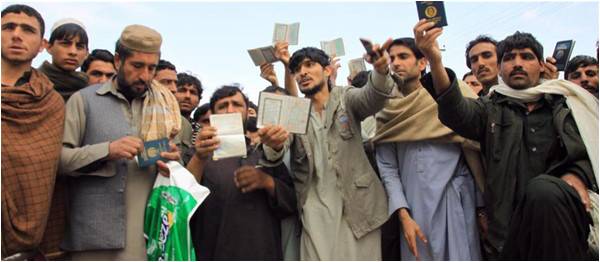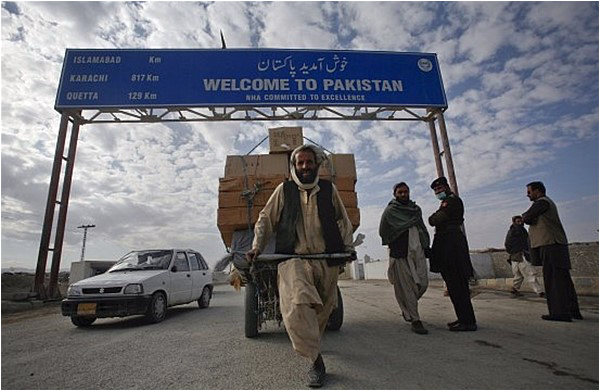
Pakistan and Afghanistan’s joint terrorism problem is getting messier. And as the Islamabad-Kabul estrangement runs its course with a settlement nowhere in sight, the two countries appear to be heading to a nasty confrontation.
The week started with one of the bigger cross-border strikes on Pakistani border posts in recent years, both in terms of casualties suffered by the security forces with five soldiers killed, and the scale of the attack, which was said to be well coordinated and involving close to a hundred Afghanistan-based Jamaat-ul-Ahrar terrorists. By Wednesday, terrorists had struck Kabul’s largest military-run health facility, the Sardar Mohammad Daud Khan Hospital. Within hours of the attack, the Afghans were pointing fingers at the Haqqani network, whose leadership is allegedly based in Pakistan, even though it was afterwards claimed by Daesh. The toll in the hospital attack was 30 by the end of Wednesday.

The two incidents remind that with time and more attacks, the prospects of the two countries reaching an agreement on cooperation against terrorism are rapidly diminishing. The situation appears particularly grimmer with the Taliban’s annual Spring Offensive just weeks away. Once launched, it is expected to lead to a significant spike in attacks in Afghanistan.
The region has been afflicted by terrorism for over a decade and a half now and the two neighbours’ mutual mistrust is not new. Bilateral relations have been further strained after last month’s wave of attacks in Pakistan, following which it closed crossing points on the border, adding to the strain. The stalemate persists over the closure of crossing points, notwithstanding a temporary break for two days this week to allow stranded people to return. Negotiations on a joint counter-terrorism mechanism, is headed nowhere in the meantime. The fears of terrorists on both sides benefitting from the rift and gaining greater operational space are fast turning out to be true.
The urgency of preventing a slide in relations is prima facie lost on the leadership in both capitals even though Islamabad/Rawalpindi’s rhetoric did lower slightly. Army Chief General Qamar Bajwa had stressed the need for better cooperation with the Afghan side, something that was also reflected in an ISPR statement after the border post incident. “Terrorists are a common threat,” it said, urging the Afghans to take measures on their side for border security and deny terrorists freedom of movement and action. But beyond that, there is little on the ground to suggest movement forward.
The Afghan reaction to the temporary reopening of the border crossings, which was done on their demand, was telling. Instead of welcoming this move, no matter how small it was, Afghan Ambassador Dr Omar Zakhilwal preferred to note in a statement that no progress had been made on permanently reopening the border.
After the latest escalation, both sides had shared ideas on cooperating against terrorism and apparently the border reopening is being linked by the Pakistani side to an agreement on the proposed cooperation framework. Foreign Office Spokesman Nafees Zakaria said: “The Afghan government should take firm action against the terrorists operating from its soil. Cooperation from the Afghan side for effective border management is important for preventing cross-border movement of terrorists and militants.”
The Afghans, meanwhile, are desperate to have the crossings opened because of the emerging humanitarian crisis; prices of essential commodities have almost doubled since the closure three weeks back in addition to the massive financial losses that, according to one estimate, have mounted to $80 million so far.
What Pakistanis are missing is that the issue of the terrorist sanctuaries is not a new one and has roots in the mistrust between the two countries. The Tehreek-e-Taliban Pakistan first shifted its sanctuaries to Afghan soil after the Swat operation in 2011 and the second phase came after the launch of Operation Zarb-e-Azb in June 2014. The Afghan government acknowledges their presence, but clearly wants to use the sanctuaries as a quid pro quo for an end to what it says is the Taliban/Haqqani network presence in Pakistan.
“You act on our list, we’ll act on your list. But we need to have a third-party verification; we are ready to do that, are you?” Afghan National Security Adviser Haneef Atmar says, referring to the proposal Kabul made to Pakistan on counter-terrorism cooperation. He calls it a “state-to-state war”.
Soon after the bombing at Lal Shahbaz Qalandar shrine, Pakistan handed over a list of 76 terrorists to Afghan envoys, demanding Kabul eliminate or hand them over. In return, Kabul presented its list of 85 wanted Taliban and Haqqani network leaders, seeking action against them.
Atmar vows to punish those responsible for chaos in Afghanistan and “their organizers and sponsors”. Afghan leaders, in a veiled reference to Pakistan, have also warned of diplomatic action against what they refer to as Taliban backers.
Therefore, arm twisting Kabul into cooperation is not an option. This week’s attack on the border posts from sanctuaries just proves the futility of closing the border to achieve security. Afghans have defied pressure on sanctuaries in the past, despite clear proof of logistical support for them, and will continue to. Furthermore, they have the advantage of US backing. The pattern of cross-border attacks from sanctuaries on the Afghan side of the border, it should be kept in mind, can easily be correlated with the ups and downs in bilateral ties.
No matter how frustrating the Afghan position is, it is the reality and the only way out is cooperation and coordination.
The writer is a freelance journalist based in Islamabad and can be reached at mamoonarubab@gmail.com
The week started with one of the bigger cross-border strikes on Pakistani border posts in recent years, both in terms of casualties suffered by the security forces with five soldiers killed, and the scale of the attack, which was said to be well coordinated and involving close to a hundred Afghanistan-based Jamaat-ul-Ahrar terrorists. By Wednesday, terrorists had struck Kabul’s largest military-run health facility, the Sardar Mohammad Daud Khan Hospital. Within hours of the attack, the Afghans were pointing fingers at the Haqqani network, whose leadership is allegedly based in Pakistan, even though it was afterwards claimed by Daesh. The toll in the hospital attack was 30 by the end of Wednesday.

The two incidents remind that with time and more attacks, the prospects of the two countries reaching an agreement on cooperation against terrorism are rapidly diminishing. The situation appears particularly grimmer with the Taliban’s annual Spring Offensive just weeks away. Once launched, it is expected to lead to a significant spike in attacks in Afghanistan.
The region has been afflicted by terrorism for over a decade and a half now and the two neighbours’ mutual mistrust is not new. Bilateral relations have been further strained after last month’s wave of attacks in Pakistan, following which it closed crossing points on the border, adding to the strain. The stalemate persists over the closure of crossing points, notwithstanding a temporary break for two days this week to allow stranded people to return. Negotiations on a joint counter-terrorism mechanism, is headed nowhere in the meantime. The fears of terrorists on both sides benefitting from the rift and gaining greater operational space are fast turning out to be true.
The urgency of preventing a slide in relations is prima facie lost on the leadership in both capitals even though Islamabad/Rawalpindi’s rhetoric did lower slightly. Army Chief General Qamar Bajwa had stressed the need for better cooperation with the Afghan side, something that was also reflected in an ISPR statement after the border post incident. “Terrorists are a common threat,” it said, urging the Afghans to take measures on their side for border security and deny terrorists freedom of movement and action. But beyond that, there is little on the ground to suggest movement forward.
With time and more attacks on both sides, the prospects of the two countries reaching an agreement on cooperation against terrorism are rapidly diminishing
The Afghan reaction to the temporary reopening of the border crossings, which was done on their demand, was telling. Instead of welcoming this move, no matter how small it was, Afghan Ambassador Dr Omar Zakhilwal preferred to note in a statement that no progress had been made on permanently reopening the border.
After the latest escalation, both sides had shared ideas on cooperating against terrorism and apparently the border reopening is being linked by the Pakistani side to an agreement on the proposed cooperation framework. Foreign Office Spokesman Nafees Zakaria said: “The Afghan government should take firm action against the terrorists operating from its soil. Cooperation from the Afghan side for effective border management is important for preventing cross-border movement of terrorists and militants.”
The Afghans, meanwhile, are desperate to have the crossings opened because of the emerging humanitarian crisis; prices of essential commodities have almost doubled since the closure three weeks back in addition to the massive financial losses that, according to one estimate, have mounted to $80 million so far.
What Pakistanis are missing is that the issue of the terrorist sanctuaries is not a new one and has roots in the mistrust between the two countries. The Tehreek-e-Taliban Pakistan first shifted its sanctuaries to Afghan soil after the Swat operation in 2011 and the second phase came after the launch of Operation Zarb-e-Azb in June 2014. The Afghan government acknowledges their presence, but clearly wants to use the sanctuaries as a quid pro quo for an end to what it says is the Taliban/Haqqani network presence in Pakistan.
“You act on our list, we’ll act on your list. But we need to have a third-party verification; we are ready to do that, are you?” Afghan National Security Adviser Haneef Atmar says, referring to the proposal Kabul made to Pakistan on counter-terrorism cooperation. He calls it a “state-to-state war”.
Soon after the bombing at Lal Shahbaz Qalandar shrine, Pakistan handed over a list of 76 terrorists to Afghan envoys, demanding Kabul eliminate or hand them over. In return, Kabul presented its list of 85 wanted Taliban and Haqqani network leaders, seeking action against them.
Atmar vows to punish those responsible for chaos in Afghanistan and “their organizers and sponsors”. Afghan leaders, in a veiled reference to Pakistan, have also warned of diplomatic action against what they refer to as Taliban backers.
Therefore, arm twisting Kabul into cooperation is not an option. This week’s attack on the border posts from sanctuaries just proves the futility of closing the border to achieve security. Afghans have defied pressure on sanctuaries in the past, despite clear proof of logistical support for them, and will continue to. Furthermore, they have the advantage of US backing. The pattern of cross-border attacks from sanctuaries on the Afghan side of the border, it should be kept in mind, can easily be correlated with the ups and downs in bilateral ties.
No matter how frustrating the Afghan position is, it is the reality and the only way out is cooperation and coordination.
The writer is a freelance journalist based in Islamabad and can be reached at mamoonarubab@gmail.com

